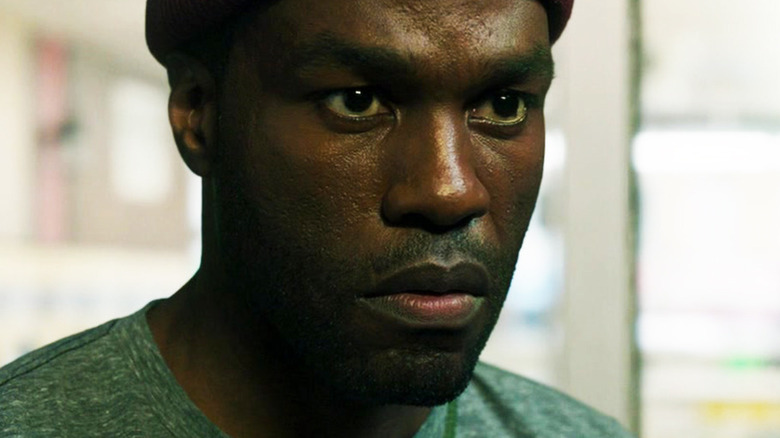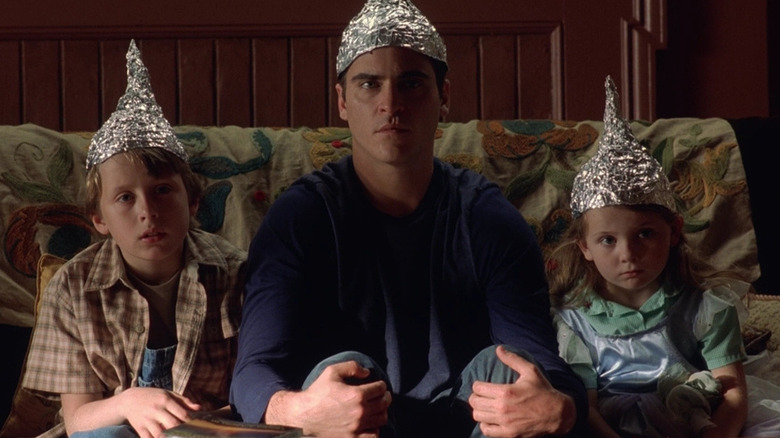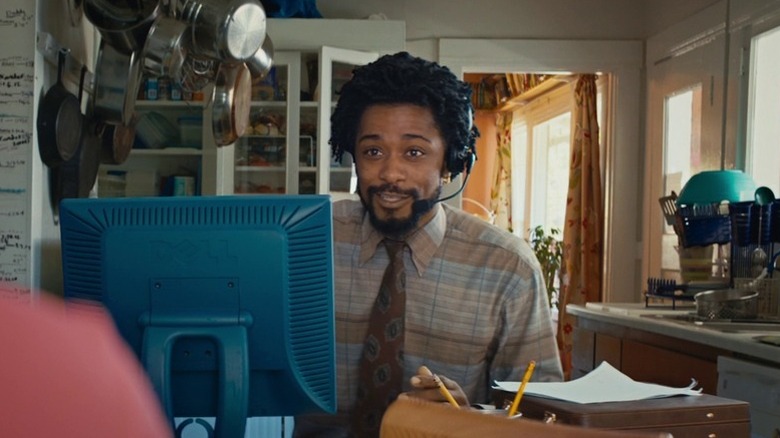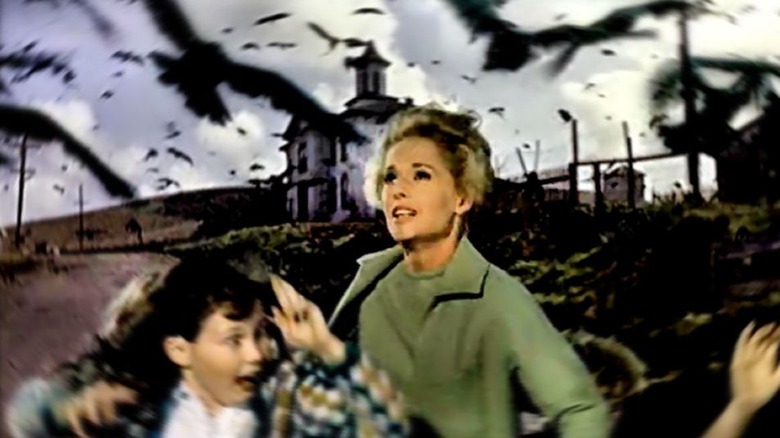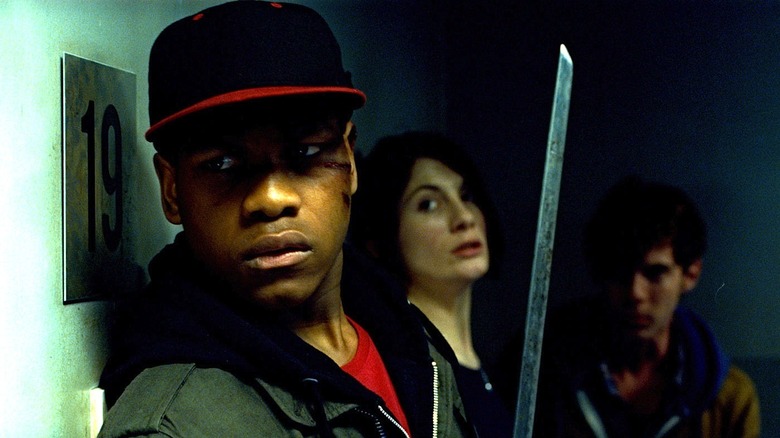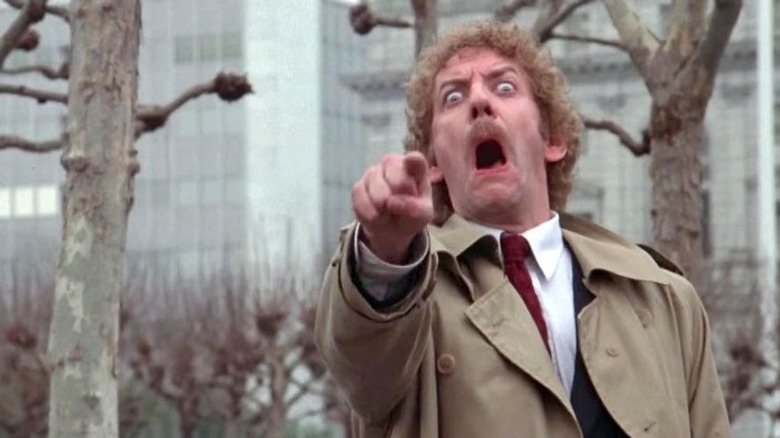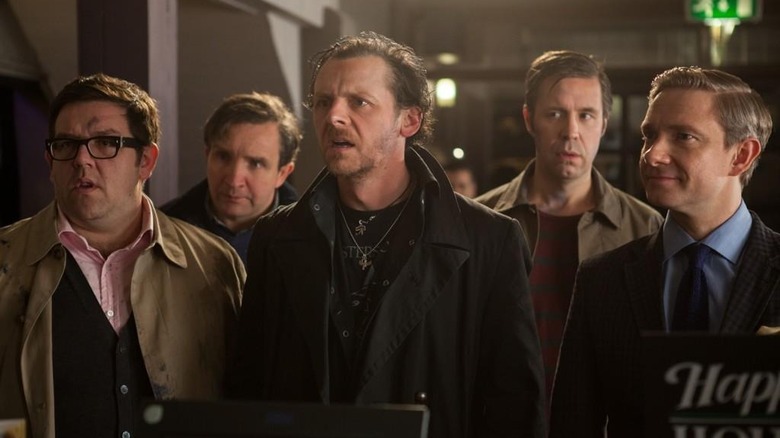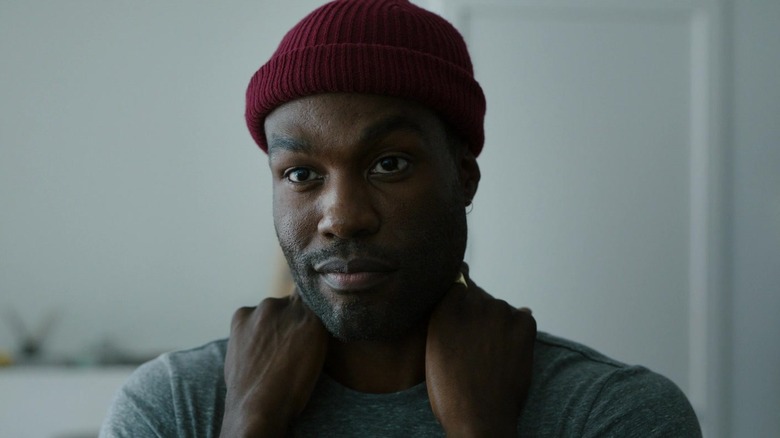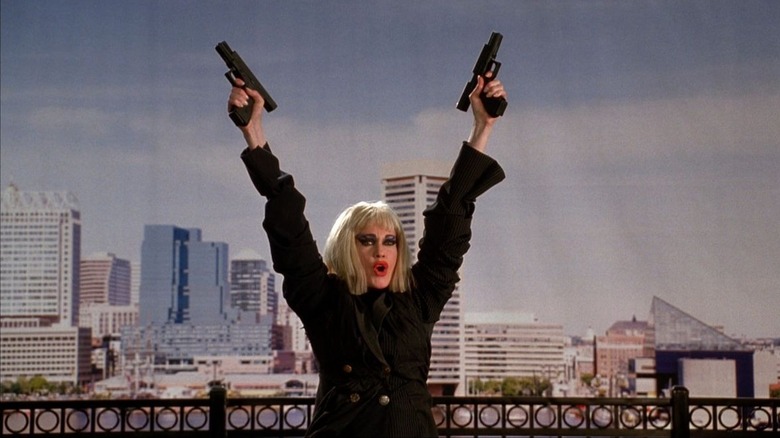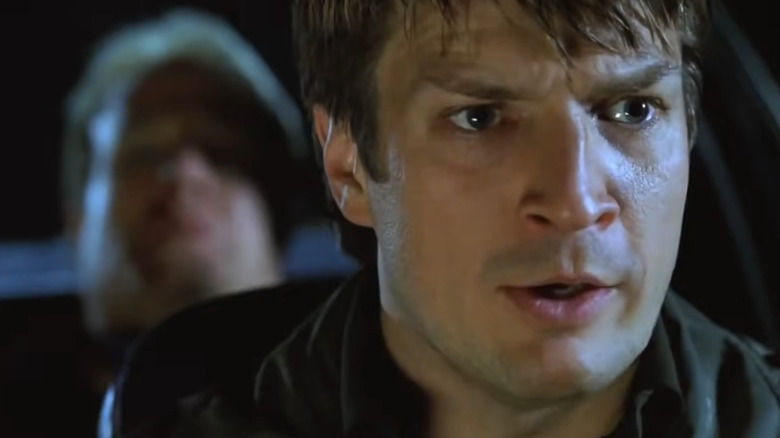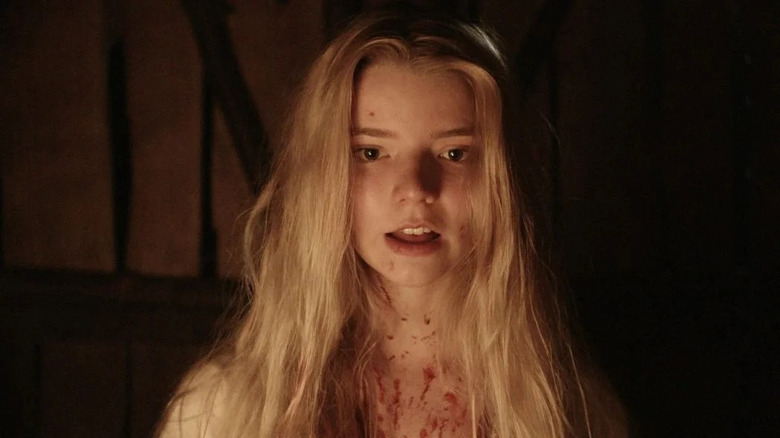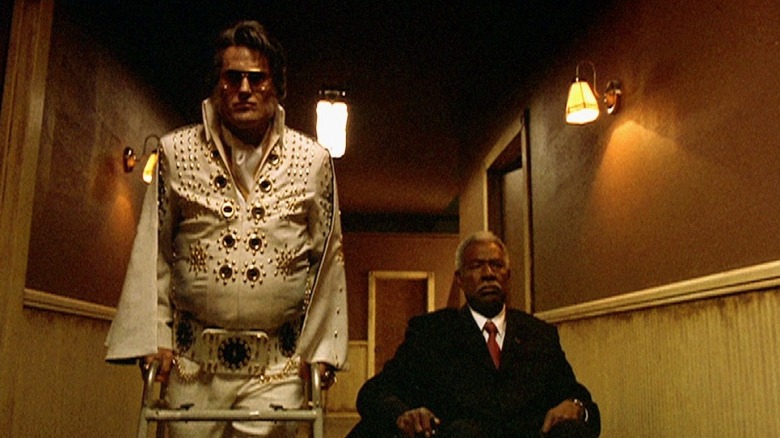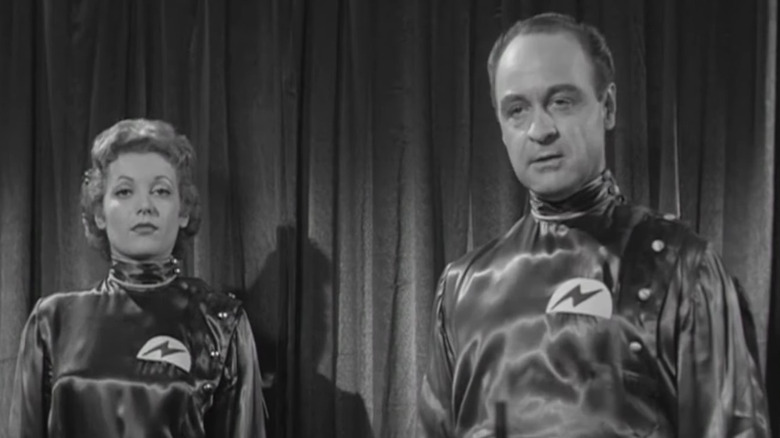12 Best Movies Like Nope That Fans Should Check Out Next
Jordan Peele's 2022 film "Nope" is yet another treat for fans of smart, vivid, and deeply original horror movies. But it's not enough to call "Nope" a horror movie, nor even an "elevated horror" movie, and not just because that term is hotly debated among cinephiles. Like the rest of Peele's work, "Nope" distills a vast variety of influences into a completely singular concoction. Sci-fi, social commentary, family drama, nostalgia, horror tropes, film history, pop culture, and a healthy dose of camp are all present within this film, drawn from both high-brow and low-brow sources. It's a horror movie, but that's not all it is.
Peele isn't the first filmmaker to paint the screen with such an eclectic palette. Because horror movies can be made with comparatively small budgets and enjoy broad creative freedoms, Hollywood's most inventive and resourceful directors tend to gravitate towards the genre. Not all of their films get the respect they deserve in their time — in fact, some are downright eviscerated. But many do, and even those flicks that go underappreciated often become cult classics. From hammy gore-fests to bizarre alien comedies, these are the 12 best movies like "Nope" fans should check out next.
Signs
Jordan Peele and M. Night Shyamalan have more in common as filmmakers than you might realize. Both are writer-directors who play around with horror and comedy, love a good twist, and cameo in their own movies. Both also found quick success with their critically-acclaimed and crowd-pleasing hits "Get Out" and "The Sixth Sense." Even more similar are Peele's third motion picture, "Nope," and Shyamalan's third major release, 2002's "Signs." In addition to their pithy one-word titles, these films both involve farm families squaring off against aliens who make animals go crazy and get captured on film. They're also relatively twist-free, compared to their directors' other work.
The Hess family of "Signs" is still in mourning after the accidental death of wife and mother Colleen when unexplained crop circles start appearing in their cornfields. Father Graham (Mel Gibson), kids Morgan (Rory Culkin) and Bo (Abigail Breslin), and brother-in-law Merrill (Joaquin Phoenix) must determine if there's a real threat, or if their traumatized imaginations are getting the best of them. Like "Nope," "Signs" is full of quirky, lived-in performances and vibes that ride the lines between funny, eerie, and all-out scary. Shyamalan's extraterrestrial tale also boasts an admirably not-too-sweet message about family and faith, though it works great as a PG-13 thrill ride, too. Furthermore, though the Hesses aren't the ones behind the camera, "Signs" has one of the most realistic and terrifying alien reveals in movie history.
Sorry to Bother You
Absurdist comedy "Sorry to Bother You" morphs into body horror as it explores the ways capitalism exploits the oppressed. This 2018 Boots Riley film is much more satirical than "Nope," but it shares many of its sensibilities and is worth a watch for an out-of-left-field third act development alone.
Lakeith Stanfield plays Cash Green, a telemarketer for ambiguously nefarious company RegalView, who finds that when he adopts a "white voice" on calls, he moves up the corporate ladder. This sudden mobility shifts his sociopolitical point of view, putting him at odds with his struggling artist girlfriend Detroit (Tessa Thompson) and labor organizer Squeeze (Steven Yeun). At first, Cash can't help but enjoy the perks of what he thinks is a job well done, from his new apartment to VIP parties. But then he discovers the truth about RegalView, which is weirder and more horrific than he could have ever imagined. Like Peele's best stuff, "Sorry to Bother You" doesn't call out easy targets — rather, it challenges all its characters in ways the audience doesn't see coming.
The Birds
There's a reason all film fans need to watch Alfred Hitchcock's movies: The hugely prolific director understood the medium like no one else. He often put this knowledge towards suspenseful thrillers. Plain old human evil typically provides the scare factor in these films, but occasionally, they get a little supernatural. One such example is 1963's "The Birds" starring Tippi Hedren.
Hedren plays Melanie, a well-to-do woman who meets a man at a pet store while he's shopping for a pair of love birds. Smitten, she tracks him down to his California hometown, which begins to experience inexplicable attacks by aggressive birds. At first, it's an odd peck here and there. But before long, thousands of murderous avians are tormenting the locals. They blame newcomer Melanie, who is victimized by the creatures herself.
In February 2022, Jordan Peele shared a viral video on Twitter about a mysterious incident involving birds, which he tagged "#NOPEMOVIE." Indeed, "Nope" sees aliens affect animals' behavior. "The Birds" is less explicit about why its creatures do what they do; rather, they're symbolic of love gone wrong and the mistreatment of nature. But both films understand how terrifying it is when placid members of the animal kingdom attack.
Attack the Block
2011's "Attack the Block" launched the career of John Boyega, who stars as small-time gang leader Moses. His crew of wayward teens, who all live in public housing in and around a London tower block, are in the middle of holding up a young nurse when the sky begins to fall. Phosphorescent aliens are descending, and — much like OJ and Emerald in "Nope" — Moses decides to treat the invasion as an opportunity.
The group manages to kill the first creature they encounter, and hang onto its carcass as proof of their accomplishment. Emboldened, they take on the role of Earth's protectors and seek out other alien crash sites. But it turns out that the first alien was on the small side. Now the gang has a horde of massive space beasts after them, as well as the local police force. If they're going to survive, they'll need help from Samantha, the nurse they attempted to mug.
"Attack the Block" is one of the most energetic and refreshing viewing experiences the genre has to offer. Like "Nope," it's not afraid to blend big societal themes with bizarre humor and out-there genre antics. In both films, this bold approach results in a fantastical story deeply rooted in vivid human experiences.
Invasion of the Body Snatchers
Fear of having one's body, world, or society overtaken by outside forces is the root of many horror movies. Jordan Peele memorably explores this notion in both "Get Out" and "Nope." Another chilling example is 1978's "Invasion of the Body Snatchers." In this intensely ominous film, aliens disguise themselves as seemingly innocuous pink flowers. These blooms snatch the bodies of people they come into contact with and create perfect duplicates, who are utterly devoid of emotion.
Two officials from the San Francisco Health Department, Elizabeth (Brooke Adams) and Matthew (Donald Sutherland), become suspicious. Elizabeth's boyfriend doesn't seem like himself after she brings one of the flowers home, and Matthew soon realizes he can no longer trust that the authorities are actually the authorities. Like "Nope," "Invasion of the Body Snatchers" examines conformity, consumerism, and community stewardship of resources through a terrifying tale of alien invasion. Both films also feature truly striking visuals.
The World's End
Edgar Wright's films often start in the real world, then evolve into high-octane genre romps starring regular guys like Simon Pegg and Nick Frost. His "Cornetto" trilogy, which includes "Shaun of the Dead" and "Hot Fuzz," concludes with 2013's aptly titled "The World's End."
Immature Gary King (Pegg) reassembles his high school friends to complete a pub crawl they failed to finish more than two decades earlier. But their quest is doomed from the get-go. Gary's former best mate, Andy (Frost), has gotten sober following a drunk driving accident. They cross paths with a girl who came between them during their previous attempt. A bartender informs them they've been banned. Gary gets into fights with rowdy teenagers. Oh, and the town has largely been replaced by androids who are being remotely controlled by aliens. If this ragtag group of middle-aged louses can't stop them, humanity will be assimilated into the singularity.
"The World's End" (which is the name of the final bar in the pub crawl, as well as the film's stakes) is less about systemic social issues and more about personal obstacles. But, like "Nope," it incorporates clever gags, genuine vulnerability, and a sprinkling of graphic violence into a one-of-a-kind story. Both films know the apocalypse is a big deal, but they also know it would be an absurd affair — humanity tends to have that effect on everything.
Candyman
Nia DaCosta directed 2021's "Candyman," while Jordan Peele served as co-writer and producer. Both filmmakers' talents are on lavish display in this terrifying film. Yahya Abdul-Mateen II and Teyonah Parris star as Anthony and Brianna, an artsy couple who move into a swanky Chicago apartment building near the former site of the Cabrini-Green housing projects. The events of the original 1992 film have become the stuff of legend, which piques Anthony's interest. According to locals, the Candyman is a mysterious figure with a hook for a hand who can be summoned by saying his name five times into a mirror. Against Brianna's better judgment, Anthony looks into the tale's history and tries calling the Candyman himself. He finds much more than inspiration.
Like "Nope," "Candyman" uses genre tropes to capture the violence and alienation that lurks beneath the surface of everyday life. This results in a deeply uneasy tone that lingers with viewers long after the credits roll. As Anthony compulsively creates pieces in the Candyman's image, the mysterious entity wreaks havoc on the long-suffering neighborhood. But "Candyman" suggests that the blame for this terror goes far beyond the being himself.
Cecil B. Demented
Jordan Peele isn't too precious to step across the line that separates the prestigious and the profane. John Waters' filmography proudly exists almost entirely on the profane side, which affords the cult auteur an unparalleled amount of artistic freedom. This approach isn't for everybody, but his poppy, transgressive style has undoubtedly affected those who've come after him. 2000's "Cecil B. Demented" isn't, at first glance, an obvious precursor to "Nope," but in fact, the two films play in the same sandbox.
Melanie Griffith plays Honey Whitlock, an A-list actress who projects sweetness and light but is actually kind of a pill. A troupe of "kamikaze filmmakers" led by the titular director plot to kidnap Honey and force her to star in their masterpiece. They're unapologetic terrorists with very strong feelings about commercial studio pictures, and hope to create something authentic by keeping Honey as a hostage and ambushing the public. Surprisingly, Honey begins to participate enthusiastically in the shoot and becomes fascinated by the ongoing news story concerning her disappearance.
"Cecil B. Demented" is as over-the-top as a tongue-in-cheek critique of fame can be. Though "Nope" is considerably less, well, demented, these movies share an appreciation of the outré, and an interest in infusing the mainstream with the grotesque.
Slither
Before writer-director James Gunn helmed "Guardians of the Galaxy" and "The Suicide Squad," he made his debut with 2006 gross-out extravaganza "Slither." Like "Nope," "Slither" relies upon the audience's familiarity with horror, comedy, and sci-fi conventions. Both films also share a number of plot points, and, to some degree, a wicked sense of humor.
In Gunn's horror-comedy, alien parasites invade Earth with the intent of expanding their hive mind. They start with affluent local man Grant Grant (Michael Rooker), who becomes ever more monstrous as he does the aliens' bidding. The public takes notice when a woman goes missing and animals start to die en masse. Eventually, Grant attempts to infect everyone and everything else in town, including his wife (a truly game Elizabeth Banks).
Despite strong reviews, "Slither" was such a failure at the box office, The Hollywood Reporter wondered if it might have killed off the horror-comedy altogether. Turns out, this knowing gore and guffaw-fest was ahead of its time. "Nope" is considerably less gross and goofy, but the legacy of Gunn's oddball film is apparent in its offbeat sense of humor and memorable embrace of alien archetypes.
The Witch
Like Jordan Peele, Robert Eggers, director of "The Lighthouse" and "The Northman," doesn't fit into any one genre box. His first film, 2015's "The Witch," is set in 1600s New England and stars Anya Taylor-Joy as Thomasin, eldest daughter of a pious family that's been cast out of their village. They set up a homestead in an old growth forest, where Thomasin's mother prepares to give birth to her fifth child. But before the child can be baptized, he's stolen and sacrificed by a bloodthirsty witch. As other calamities befall the family — thefts, a bad harvest, the unexplained deaths of their animals, and the increasingly strange behavior of their remaining children — they begin to suspect that Thomasin is the demonic force at fault.
A purposefully restrained and sedate horror period piece, "The Witch" is less plot-driven than "Nope" and features no aliens. But these films share a creeping sense of dread that is evocatively and thoughtfully developed. Intriguingly, "Nope" and "The Witch" also postulate the issues that plague our realities and fantasies might be interconnected.
Bubba Ho-Tep
Of all the films in B-movie legend Bruce Campbell's filmography, 2002's "Bubba Ho-Tep," written and directed by Don Coscarelli, most closely resembles Jordan Peele's oeuvre. Campbell portrays Sebastian, an elderly man who claims to be Elvis Presley. His friend Jack (Ossie Davis) similarly insists he's actually JFK. Together, they defend the Shady Rest Retirement Home from Bubba Ho-Tep, a ravenous Egyptian mummy who's come back to life after being lost as part of a traveling museum exhibit.
Much of the horror and comedy of "Bubba Ho-Tep" come from its cast and setting, as the residents must contend with their own infirmities as they fight off an undead menace. Campbell more than lives up to the challenge of playing a peculiar yet relatable version of Elvis Presley (or at least, a man who thinks he's Elvis Presley). "Nope" is similarly buoyed by its killer cast and eerie landscape. Both films also confidently blend horror, comedy, sci-fi, and fantasy in an effort to explore the entertainment industry, race, and the very concept of American identity itself. That's a lot to tackle, but Coscarelli and Peele are more than up to the task.
Plan 9 from Outer Space
1957's "Plan 9 from Outer Space" has the notorious distinction of being named the worst movie ever made, according to The Los Angeles Times. So why is it on this list of good movies? Because Ed Wood's infamous flick has become a cult classic. In part, this is because it's so bad it's good, but it's also because the film has a truly earnest heart and interesting ideas. In many ways, it's a prototype of "Nope," which is admittedly far better in terms of acting, production design, writing, and, well, everything else. Still, the make-it-work spirit of "Plan 9 from Outer Space" made a major mark on modern genre films — especially ones willing to present big ideas.
As is the case in "Nope," "Plan 9 from Outer Space" begins with mysterious deaths in California and a flying saucer appearing in the sky. The news covers the invasion, and as the government fails to properly deal with the threat, paranoia and hysteria spread. So too does the alien menace. The film gets more outrageous as it goes on, to the point that it just can't be taken as seriously as "Nope" — or at least, not in the same way. However, this infamous piece of Hollywood history is weirdly irresistible, especially at a mere 80 minutes. Moreover, its improvisations have become conventions and had a lasting impact on directors like Peele.
